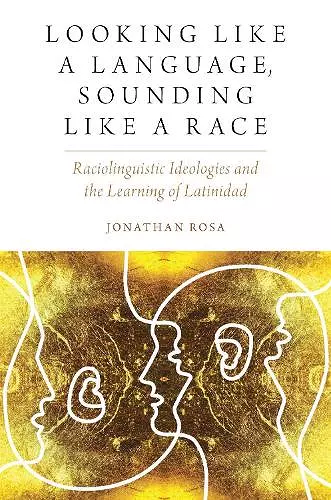Looking like a Language, Sounding like a Race
Raciolinguistic Ideologies and the Learning of Latinidad
Format:Hardback
Publisher:Oxford University Press Inc
Published:17th Jan '19
Currently unavailable, and unfortunately no date known when it will be back

Winner of the 2020 AAAL First Book Award
Looking like a Language, Sounding like a Race examines the emergence of linguistic and ethnoracial categories in contemporary U.S. constructions of Latinidad. The book draws from long-term ethnographic research in a Chicago high school and its surrounding communities to analyze the creation and contestation of political, ethnoracial, and linguistic borders.Looking like a Language, Sounding like a Race examines the emergence of linguistic and ethnoracial categories in the context of Latinidad. The book draws from more than twenty-four months of ethnographic and sociolinguistic fieldwork in a Chicago public school, whose student body is more than 90% Mexican and Puerto Rica, to analyze the racialization of language and its relationship to issues of power and national identity. It focuses specifically on youth socialization to U.S. Latinidad as a contemporary site of political anxiety, raciolinguistic transformation, and urban inequity. Jonathan Rosa's account studies the fashioning of Latinidad in Chicago's highly segregated Near Northwest Side; he links public discourse concerning the rising prominence of U.S. Latinidad to the institutional management and experience of raciolinguistic identities there. Anxieties surrounding Latinx identities push administrators to transform 'at risk' Mexican and Puerto Rican students into 'young Latino professionals.' This institutional effort, which requires students to learn to be and, importantly, sound like themselves in highly studied ways, reveals administrators' attempts to navigate a precarious urban terrain in a city grappling with some of the nation's highest youth homicide, dropout, and teen pregnancy rates. Though seemingly well-intentioned, the result for these youths is often an inauthentic, conflicted identity. Rosa explores the ingenuity of his research participants' responses to these forms of marginalization through the contestation of political, ethnoracial, and linguistic borders.
Looking like a Language, Sounding like a Race is pathbreaking in its focus on how Latinxs are racialized through language. In a moment when the relationship between race and Latinidad is hotly debated, Rosa's text helps us to better understand not only how Latinxs make sense of race but also how they seek to assert racialized difference within white supremacist and colonial structures of power. * Marisol LeBrón, American Anthropologist *
Jonathan Rosa's Looking like a language, sounding like a race: Raciolinguistic ideologies and the learning of Latinidad might be one of the most powerful books written on race and language of the past few decades, which I do not state with any intended hyperbole, but in a matter-of-fact consideration of how the book ambitiously accomplishes what it sets out to do. * Casey Philip Wong, Language in Society *
- Winner of Winner, Outstanding Book of the Year Award, American Association of Teaching and Curriculum Winner, 2020 AAAL First Book Award Winner, 2020 Prose Award for Excellence in Language & Linguistics, Association of American Publishers.
ISBN: 9780190634728
Dimensions: 160mm x 236mm x 23mm
Weight: 641g
308 pages